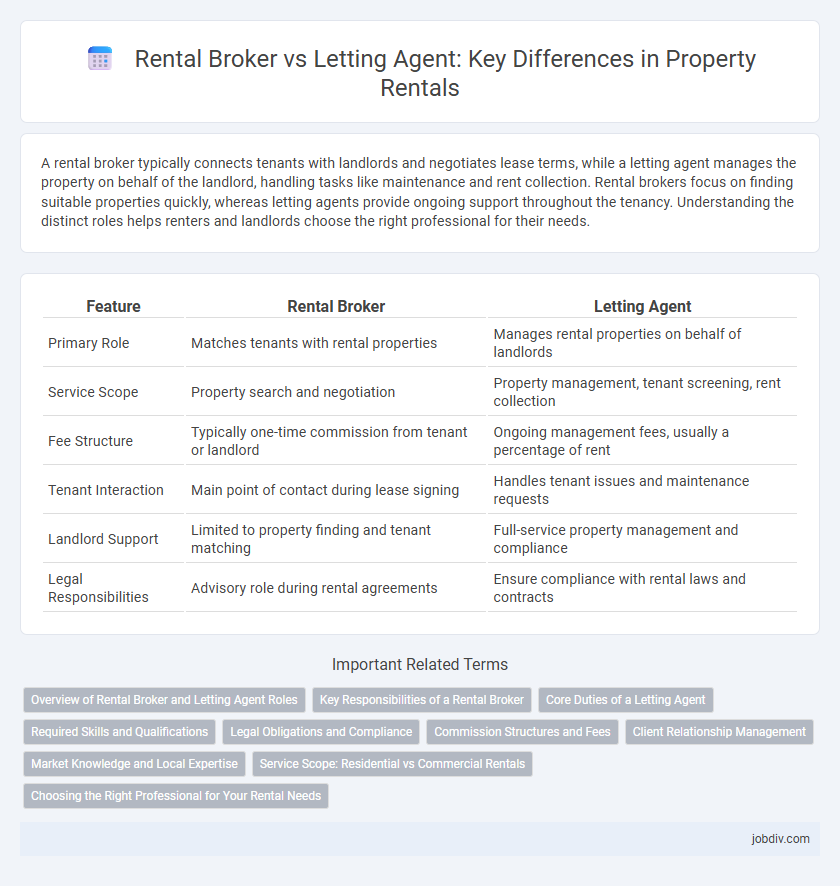A rental broker typically connects tenants with landlords and negotiates lease terms, while a letting agent manages the property on behalf of the landlord, handling tasks like maintenance and rent collection. Rental brokers focus on finding suitable properties quickly, whereas letting agents provide ongoing support throughout the tenancy. Understanding the distinct roles helps renters and landlords choose the right professional for their needs.
Table of Comparison
| Feature | Rental Broker | Letting Agent |
|---|---|---|
| Primary Role | Matches tenants with rental properties | Manages rental properties on behalf of landlords |
| Service Scope | Property search and negotiation | Property management, tenant screening, rent collection |
| Fee Structure | Typically one-time commission from tenant or landlord | Ongoing management fees, usually a percentage of rent |
| Tenant Interaction | Main point of contact during lease signing | Handles tenant issues and maintenance requests |
| Landlord Support | Limited to property finding and tenant matching | Full-service property management and compliance |
| Legal Responsibilities | Advisory role during rental agreements | Ensure compliance with rental laws and contracts |
Overview of Rental Broker and Letting Agent Roles
Rental brokers facilitate connections between landlords and tenants, handling property marketing, tenant screenings, and lease negotiations to secure rental agreements efficiently. Letting agents manage day-to-day rental property operations, including rent collection, maintenance coordination, and tenant communication, ensuring smooth property management. Both roles are crucial in the rental market, yet rental brokers primarily focus on transaction facilitation while letting agents emphasize ongoing property administration.
Key Responsibilities of a Rental Broker
A rental broker specializes in connecting tenants with landlords by negotiating lease terms and ensuring compliance with rental laws. They conduct market analysis to determine competitive rental prices and facilitate smooth communication between parties. Their key responsibilities include screening tenants, managing documentation, and resolving disputes during the rental process.
Core Duties of a Letting Agent
Letting agents primarily manage property rentals by marketing listings, conducting tenant screenings, and handling lease agreements to ensure compliance with legal standards. They coordinate property maintenance and inspections, acting as intermediaries between landlords and tenants to address issues promptly. Unlike rental brokers, letting agents provide ongoing management services throughout the tenancy period, focusing on maximizing rental income and tenant satisfaction.
Required Skills and Qualifications
Rental brokers require strong negotiation skills, market knowledge, and a valid real estate license to legally facilitate property transactions. Letting agents must demonstrate expertise in property management, tenant relations, and compliance with housing regulations, often holding certifications like ARLA Propertymark in the UK. Both roles demand excellent communication, customer service abilities, and familiarity with local rental laws for effective leasing processes.
Legal Obligations and Compliance
Rental brokers primarily facilitate tenant-landlord connections without managing properties, so their legal obligations include verifying client identities and complying with fair housing laws. Letting agents handle property management duties such as maintenance coordination and rent collection, requiring strict adherence to tenancy regulations, deposit protection schemes, and regular safety inspections like gas and electrical checks. Both roles must maintain transparent contracts and ensure compliance with local rental laws to avoid legal liabilities and protect tenant rights.
Commission Structures and Fees
Rental brokers typically charge a commission based on a percentage of the annual rent, often ranging from 8% to 12%, paid by the landlord or tenant depending on regional practices. Letting agents usually levy fees for services such as tenant placement, property management, and maintenance, which may include fixed setup fees, monthly management fees around 10% of rent, and additional charges for inspections or renewals. Understanding the distinct fee structures is crucial for landlords and tenants to optimize rental expenses and service quality.
Client Relationship Management
Rental brokers manage a broader client base, facilitating property transactions between owners and tenants with a strong emphasis on negotiation and closing deals. Letting agents specialize in tenant management, handling lease agreements, rent collection, and property maintenance coordination to ensure smooth tenancy experiences. Effective client relationship management in both roles relies on clear communication, responsive service, and personalized support to build trust and retain clients.
Market Knowledge and Local Expertise
Rental brokers possess extensive market knowledge, offering broad insights across multiple neighborhoods and property types, which enables them to match tenants with a variety of rental options. Letting agents specialize in specific local areas, providing in-depth expertise about community amenities, local regulations, and tenant expectations, ensuring a more tailored rental experience. Their complementary skills allow renters to benefit from both comprehensive market data and precise local insights when searching for a property.
Service Scope: Residential vs Commercial Rentals
Rental brokers typically specialize in commercial property rentals, offering services such as market analysis, lease negotiation, and tenant sourcing for businesses. Letting agents primarily handle residential rentals, managing tenant placement, rent collection, and property maintenance for landlords. Understanding the distinct service scopes helps property owners choose the right professional for their specific rental needs.
Choosing the Right Professional for Your Rental Needs
Choosing the right professional for your rental needs involves understanding the distinct roles of a rental broker versus a letting agent. Rental brokers specialize in matching tenants with properties quickly, often dealing with multiple landlords and offering a wide range of rental options. Letting agents provide comprehensive property management services, including tenant screening, rent collection, and maintenance coordination, making them ideal for landlords seeking ongoing support.
Rental Broker vs Letting Agent Infographic

 jobdiv.com
jobdiv.com